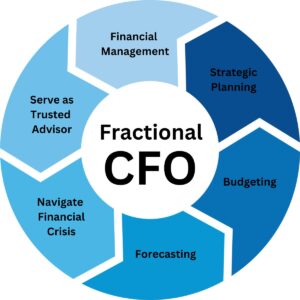You’re as busy as a one-armed wallpaper hanger and you’re trying to manage every role there is to manage in your business. But you’re wondering if now might be a good time to bring on a fractional CFO. Good for you. From steering day-to-day operations to charting pathways for sustained growth, your plate is undeniably full. Amidst these challenges, the realm of financial management emerges as a pivotal focal point. This is precisely where the notion of engaging a fractional CRO (Chief Revenue Officer) holds significant sway. But the fractional executive that’s equally important; that of the fractional Chief Financial Officer, is one worth exploring, so we’re going to do just that and answer the really tough question as to whether or not a fractional CFO is worth it.
Within the realm of financial management, one particular solution stands out: the fractional Chief Financial Officer (CFO). This specialized role offers a strategic approach to handling finances without the commitment of a full-time hire. This role tends to get confused with the fractional CRO at times, but is very different. So, let’s delve into the benefits and considerations surrounding the utilization of fractional CFOs.
What are the benefits of a fractional CFO?

Is a fractional CFO worth it?
Fractional CFOs typically work in tandem with the Chief Revenue Officer. When it comes to being a fractional CFO, the benefits are plentiful. By engaging the services of a fractional CFO, you gain access to seasoned financial expertise without the hefty price tag of a full-time executive. These professionals bring a wealth of experience to the table, having worked with numerous companies across various industries. They can offer valuable insights and strategic guidance to help you navigate complex financial challenges and maximize profitability. As a small to medium sized business, a fractional CFO may be just what the doctor ordered.
Fractional CFOs Bring Solutions
In a small to midsize business, CEOs often face a myriad of financial stresses that can significantly impact the company’s growth trajectory. Here are some common challenges that a fractional CFO can help alleviate:
- Financial Strategy: CEOs may struggle with developing and executing a comprehensive financial strategy to drive sustainable growth. A fractional CFO brings expertise in financial planning and analysis, helping CEOs navigate market fluctuations, identify growth opportunities, and make informed strategic decisions.
- Cash Flow Management: Maintaining healthy cash flow is crucial for the day-to-day operations and long-term viability of a business. Fractional CFOs can implement cash flow forecasting models, optimize working capital management, and establish contingency plans to ensure sufficient liquidity during lean periods.
- Financial Reporting: Small to midsize businesses often lack the resources to produce accurate and timely financial reports. A fractional CFO can streamline financial reporting processes, ensuring compliance with regulatory requirements and providing valuable insights into the company’s financial performance.
- Cost Control: Controlling costs is essential for maximizing profitability, especially in competitive markets. Fractional CFOs can conduct thorough cost analyses, identify inefficiencies, and implement cost-saving measures without sacrificing quality or productivity.
- Strategic Financial Partnerships: Building strategic financial partnerships with investors, lenders, and other stakeholders is critical for accessing capital and fueling growth. Fractional CFOs can leverage their network and expertise to negotiate favorable terms, secure funding, and facilitate strategic transactions such as mergers and acquisitions.
By addressing these key financial stresses, fractional CFOs empower CEOs to focus on their core competencies, drive business growth, and achieve their strategic objectives.
What does a fractional CFO do?

CFO becomes a trusted advisor to the CEO
A fractional CFO wears many hats, serving as a trusted advisor, strategic planner, and financial steward for your business. They oversee financial planning and analysis, budgeting, forecasting, and cash flow management. They also play a key role in identifying areas for cost savings and revenue growth, helping you optimize your financial performance. Additionally, fractional CFOs often act as trusted liaisons between your company and external stakeholders, such as investors, creditors, and regulatory bodies.
Is a fractional CFO worth it?
One of the most common questions CEOs have about fractional CFOs is whether they’re worth the investment. While it’s true that the fractional CFO hourly rate is higher than traditional CFOs, the value they provide far outweighs the cost. A fractional CFO’s training typically comes with vast experience across multiple businesses which gives them the ability to quickly make a difference in your business. Their specialized expertise allows them to hit the ground running and deliver results quickly, saving you time and money in the long run. Plus, you have the flexibility to engage their services on an as-needed basis, scaling up or down depending on your business needs. Forbes reports that hiring a fractional executive brings up the revenue of a business by an average of 33%.
Fractional CFOs typically set their rates in the range of $200 to $350 per hour, translating to a monthly retainer of approximately $2,000 to $14,500. The precise rate will depend on factors such as the scope and complexity of the work, the duration of the engagement, the level of experience and expertise of the fractional CFO, as well as their industry knowledge and track record of success.

What are the duties of a fractional CFO?
When should you hire a fractional CFO?
Knowing when to hire a fractional CFO is key to maximizing the benefits they offer. Typically, companies turn to fractional CFOs when they reach a stage of growth where they require strategic financial leadership but may not yet have the resources to hire a full-time CFO. Whether you’re launching a new product, expanding into new markets, or seeking funding for growth initiatives, a fractional CFO can provide the expertise and guidance you need to succeed. Additionally, fractional CFOs can be instrumental during times of transition, such as mergers and acquisitions or leadership changes. Plan on a fractional CFO contract running a minimum of 3 months, but more likely to be 6-12 months.
The decision to hire a fractional CFO is not one to be taken lightly. However, for small to midsize companies with limited resources, the benefits far outweigh the costs. By leveraging the expertise of a fractional CFO, you can gain access to high-level financial leadership and strategic guidance without breaking the bank. So if you find yourself facing complex financial challenges or planning for future growth, consider bringing a fractional CFO on board to help steer your company toward success.
If you’re ready to kick up your revenue with a fractional CRO, then reach out to us for your private CEO Flash Focus call today. (It’s a preliminary focused and high-level 15-20-minute meeting with CEOs to highlight the main challenges. No selling. Just solutions.) Your revenue boost is waiting.


